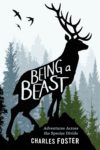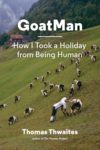Order Alert: BEING A BEAST
 In a rare advanced review, the New Yorker discusses Being a Beast: Adventures Across the Species Divide, Charles Foster (Macmillan/Metropolitan; BOT), coming out next month, calling it an “exercise of the sympathetic imagination.”
In a rare advanced review, the New Yorker discusses Being a Beast: Adventures Across the Species Divide, Charles Foster (Macmillan/Metropolitan; BOT), coming out next month, calling it an “exercise of the sympathetic imagination.”
The natural history memoir recounts Foster’s time trying to live like badgers, foxes, otters, and birds, going so far as to live in a dirt barrow, eat worms, and catch fish with his teeth.
Already published in the UK to glowing reviews, The Guardian calls it “Illuminating and unfailingly entertaining … a tour de force of modern nature writing.”
Libraries have ordered very lightly. There are few holds, but the memoir, which is being compared to H is for Hawk, is likely to get more media attention.
 Featured in the same New Yorker article is another book about living like an animal, GoatMan: How I Took a Holiday From Being Human, Thomas Thwaites (Princeton Architectural Press; OverDrive Sample). The author, a designer, writes about his efforts to become as goat-like as possible, even using prosthetic goat limbs, to become a member of a Swiss goat herd. Published last week, it received attention from NPR’s Weekend Edition Saturday as well as on NPR’s blog coincidentally titled Goats and Soda. Holds too are light on light ordering.
Featured in the same New Yorker article is another book about living like an animal, GoatMan: How I Took a Holiday From Being Human, Thomas Thwaites (Princeton Architectural Press; OverDrive Sample). The author, a designer, writes about his efforts to become as goat-like as possible, even using prosthetic goat limbs, to become a member of a Swiss goat herd. Published last week, it received attention from NPR’s Weekend Edition Saturday as well as on NPR’s blog coincidentally titled Goats and Soda. Holds too are light on light ordering.
 Two recent books suggest that if humans want to live like animals, they need to step up their game. Primatologist Frans de Waal’s new book offers a challenge in the title, Are We Smart Enough to Know How Smart Animals Are? (Norton; Blackstone Audio; OverDrive Sample). It is currently at #19 on the New York Times Hardcover Non-fiction list after two weeks.
Two recent books suggest that if humans want to live like animals, they need to step up their game. Primatologist Frans de Waal’s new book offers a challenge in the title, Are We Smart Enough to Know How Smart Animals Are? (Norton; Blackstone Audio; OverDrive Sample). It is currently at #19 on the New York Times Hardcover Non-fiction list after two weeks.
 Focusing on a specific species, Jennifer Ackerman’s The Genius of Birds(PRH/Penguin; HighBridge Audio; OverDrive Sample), released in April, received attention from NPR. The two books were reviewed jointly in the NYT Sunday Book Review.
Focusing on a specific species, Jennifer Ackerman’s The Genius of Birds(PRH/Penguin; HighBridge Audio; OverDrive Sample), released in April, received attention from NPR. The two books were reviewed jointly in the NYT Sunday Book Review.
In an interview with the Washington Post, de Waal offers an explanation for this growing interest, “I think we got tired of behaviorism, which was dominant last century. More and more phenomena are coming to the fore, of animals doing things that couldn’t be explained by simple instinct or by simple associative learning. And the younger generation is much more open to seeing what animals can do on their own terms.”
